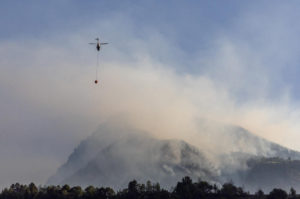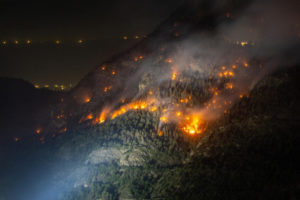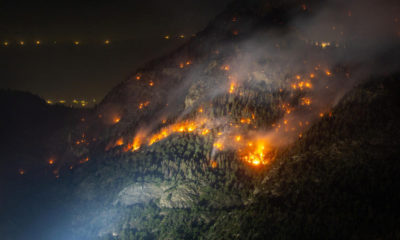International News
Europe Fires: Countries Hit By Wildfires In Past Weeks
As the region experiences record high temperatures during a summer heatwave, wildfires have continued to spread over southern Europe.
More than 21,000 people had to be evacuated from the islands of Corfu and Rhodes as a result of the spread of forest fires, making Greece one of the most impacted nations.
However, a number of other nations are also battling wildfires because of the hot weather.
Biztellers looks at the European countries where wildfires have spread in recent days
GREECE
Wildfires continue to rage on the Greek island of Rhodes, where 19,000 people have been evacuated from homes and hotels since the weekend.
Fires burning since 19 July spread to the coastal resorts on the south east of the island. An estimated 2,000 people left the island by plane on Tuesday.
Hundreds of firefighters, helped by staff from Turkey and Slovakia, have been battling blazes near the villages of Gennadi and Vati on the south east of Rhodes.
About 2,500 people were evacuated because of fires on the island of Corfu on Sunday 23 July, although many returned to their hotels on Monday. Local officials claimed the fires on Corfu were started by arsonists.
Wildfires are also burning on the island of Evia, east of Athens. On Tuesday, it was reported that a plane fighting wildfires on Evia crashed with at least two people on board.
ITALY
There are a number of wildfires burning on the Italian island of Sicily as temperatures reached 47C.
Palermo airport was forced to close for several hours on Tuesday morning after flames reached just outside the perimeter.
Italy has been severely impacted by the heatwave across southern Europe, and 16 of its cities are on red alert, including Palermo and Catania on Sicily.
Elsewhere on the island, 120 families were evacuated from their homes near the seaside resort of Mondello, according to the Ansa news agency.
There have been wildfires this week near the city of Messina, and in the San Martino delle Scale area near Palermo, where Ansa said an 88-year-old woman had died in the fires.
TURKEY
On Tuesday 25 July, firefighters battled a wildfire near the seaside resort of Kemer in Turkey.
Turkish officials said 11 aircraft and 22 helicopters were tackling the blaze, which burned 120 hectares of woodland.
A local hospital was evacuated as a precautionary measure and six people were hospitalised because of smoke inhalation
SPAIN
On 16 July, more than 4,000 people were evacuated on the Spanish island of La Palma after a wildfire.
The blaze burned 2,900 hectares of the island, including 200 hectares of the Caldera de Taburiente National Park.
Agents of the Forest Fire Intervention and Reinforcement Teams (EIRIF) of the Government of the Canary Islands intervene in the La Palma fire on July 17, 2023, in La Palma, Canary Islands (Spain).
The Forest Fire Intervention and Reinforcement Teams (EIRIF) of the Government of the Canary Islands have been working on the La Palma fire creating fire breaks.
The Spanish islands of Majorca, Ibiza and Menorca have reportedly remained on high alert this week for the risk of fires.
SWITZERLAND
On Tuesday 18 July, firefighters in Switzerland battled a forest fire on a mountain in Bitsch in the Valais area near the border with Italy.
More than 200 people were evacuated as helicopters flew overhead during the night to tackle the blaze.
The fire spread to 100 hectares of forest and was still not completely under control at the weekend.
PORTUGAL
On Tuesday 18 July , Portugal requested help in the management of wildfires from the European Union civil protection mechanism, Finland’s Interior ministry said.
Finland will send 48 rescue workers to help Portugal in the event of wildfires.
While Portugal has escaped the worst of the recent southern Europe heatwave, it is facing widespread drought, with some 90% of the country affected, after an unusually hot and dry April.
MALTA
This week, a heatwave in Malta caused temperatures to soar as high as 42C.
Its Civil Protection Department was on high alert on Monday due to the potential for wildfires in the archipelago.
By Wednesday, the island country’s temperatures should be in the mid-30s.
International News
ICC Issues Arrest Warrants For Israeli Prime Minister Netanyahu, Others
The International Criminal Court (ICC) has taken a historic step, issuing arrest warrants for Israeli Prime Minister Benjamin Netanyahu and former Defense Minister Yoav Gallant.
The charges include crimes against humanity and war crimes allegedly committed during Israel’s recent assault on Gaza.
In a detailed statement, the ICC accused the Israeli leaders of “intentionally and knowingly depriving the civilian population in Gaza of objects indispensable to their survival, including food, water, and medicine and medical supplies, as well as fuel and electricity.”
READ MORE: Osun Govt Decries Attempted Murder Of Park Mgt Chairman By Police
The ICC’s move marks a significant escalation in international scrutiny of the Israeli-Palestinian conflict. Netanyahu and Gallant are alleged to have orchestrated policies that caused severe harm to the civilian population in Gaza, leading to widespread condemnation from human rights organizations.
Alongside the charges against Israeli officials, the ICC also issued an arrest warrant for Hamas military commander Mohammed Deif. Deif has long been a central figure in Hamas’s military operations. Israel’s military claims to have killed him in a July airstrike, although this has not been independently verified.
The warrants highlight growing calls for accountability amid the ongoing conflict in the region. The ICC’s actions are likely to provoke heated debate and may complicate diplomatic efforts aimed at resolving the crisis.
With the warrants issued, global attention now turns to how the international community will respond and whether any practical steps will be taken to enforce them.
International News
COP29: Climate Summit Faces Deadlock Over Vague Funding Proposals For Vulnerable Nations
As the 29th United Nations Climate Change Summit (COP29) nears its conclusion, tensions are rising over a newly published funding proposal aimed at assisting developing nations in addressing climate-induced crises.
The proposal, released by the United Nations Framework Convention on Climate Change (UNFCCC) on Thursday, has sparked widespread debate among delegations, activists, and observers at the summit.
The document, spanning ten pages, outlines funding options to support developing countries in implementing their Nationally Determined Contributions (NDCs) under the 2015 Paris Agreement.
READ ALSO: Osun Explains N75,000 New Minimum Wage
However, it fails to specify how much wealthier nations are required to contribute annually—a key sticking point that has drawn criticism from the Global South and climate advocates.
Ambiguity in Funding Commitments
Critics argue that the absence of concrete figures undermines the credibility of the proposed framework.
Mohamed Adow, Founder and Director of Power Shift Africa, described the proposal as “a blank piece of paper,” highlighting the lack of clarity on financial commitments.
“This is the ‘finance COP.’ We came here to talk about money. The way you measure money is with numbers. We need a cheque, but all we have right now is a blank piece of paper,” Adow remarked during an interview.
The Global South, led by African delegations, is demanding at least $1.3 trillion annually by the end of the decade to adapt to climate change impacts and transition to sustainable energy systems.
Yet, developed nations have yet to commit to a specific annual figure, raising concerns over the summit’s ability to deliver tangible outcomes.
Key Provisions and Concerns
The new text acknowledges the disproportionate impact of climate change on developing nations and the financial barriers they face, including high costs of capital and limited fiscal space.
READ ALSO: NNPCL Launches Utapate Crude Oil Blend, Eyes Production Expansion In 2025
It proposes the establishment of a New Collective Quantified Goal (NCQG) for climate finance, suggesting a framework of “at least USD [X] trillion annually” from 2025 to 2035.
However, the absence of defined numbers has led to frustration among negotiators.
David Tong, Global Industry Campaign Manager at Oil Change International, emphasized the critical role of finance in achieving meaningful progress.
“Without finance, there is no phase-out [of fossil fuels], no energy transition, no adaptation. The ambitious options are simply missing,” Tong stated during a press briefing.
Rising Frustration from the Global South
Delegates from the Global South have expressed dissatisfaction with what they perceive as weak commitments from developed nations.
Many fear that without concrete financial pledges, the summit’s outcomes may fall short of expectations.
“This summit is about delivering justice to those who suffer most from climate impacts. Wealthy nations must step up and provide the necessary funding,” said an African negotiator, speaking on condition of anonymity.
A Critical Juncture
With less than 48 hours remaining in the summit, the stakes are high. The COP29 negotiations in Baku, dubbed the “finance COP,” are expected to set a precedent for addressing the financial needs of vulnerable nations.
Delegates are calling on world leaders to finalize an ambitious NCQG target and bridge the growing divide between developed and developing nations.
International News
Biden Approves Anti-Personnel Mines For Ukraine
In a significant policy move, U.S. President Joe Biden has authorised the transfer of anti-personnel mines to Ukraine, signaling heightened support for the country amid its ongoing struggle against Russian forces.
The decision underscores the administration’s commitment to bolstering Ukraine’s defensive capabilities as the conflict shows no signs of abating.
This announcement follows reports that Ukrainian forces have employed U.S.-supplied ATACMS missiles to conduct precision strikes within Russian territory.
These developments have reportedly prompted Russian President Vladimir Putin to modify elements of Russia’s nuclear doctrine, further intensifying global scrutiny of the conflict’s escalation.
READ MORE: Vinicius Jr. Honors Cameroonian Roots Ahead Of Brazil’s Clash With Uruguay
In addition to the mines, the U.S. is set to unveil a new $275 million military aid package for Ukraine in the coming days. The package is expected to include a range of munitions and equipment aimed at enhancing Ukraine’s operational readiness.
This move aligns with Washington’s broader strategy to maintain robust support for Kyiv, even as questions loom over potential shifts in U.S. foreign policy with the approaching transition to a new administration.
The U.S. government has remained steadfast in its support for Ukraine, with officials emphasizing that these measures are essential for helping Ukraine defend its sovereignty. The provision of anti-personnel mines, however, marks a controversial step, reflecting the urgency of the situation on the ground.
As the conflict continues, the Biden administration’s decisions will likely have profound implications not only for Ukraine but also for the broader geopolitical landscape, where tensions remain high and outcomes uncertain.















